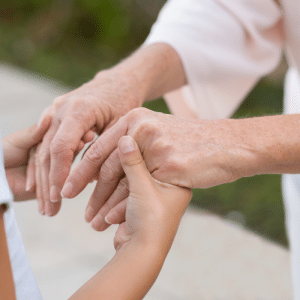Change of the Seasons
We are currently in the depths of winter. For some, that might be more noticeable than for others. The days are getting longer, the sun is coming out more, the temperature is starting to be above the 30s at least a couple times a week. It’s all so exciting! New life and springtime are just around the corner. The change of the seasons always makes me reflect about life and how we are always going through different seasons throughout our lives. We go through seasons of joy, depression, loss, hurt, forgiveness, disappointment, death, and seasons of contentment, peace and new life. Transition, transition, transition, it’s a part of what makes life, life.
Maybe you or a family member are in a season of major transition. The older we get, the transition to a life of less mobility looms closer. Some of you may have already gone through the transition or some of you might be thinking about it for yourself or for a loved one. The transition could involve moving into an assisted living home, nursing home or maybe into a relative’s home, because you just can’t do the things that you used to be able to do. These transitions can be scary. A lot of people do not like change. This is especially common for the elderly. I think one of the important things to remember when you are going through a season of change, is to give yourself grace.
When you transition, it means that something in your life is coming to an end. There is often a grieving process that we need to go through in our hearts when something in our lives is completed. First, we go through denial, trying to put off the inevitable, and not fully accepting the change that needs to happen. Then we go through times of disappointment, sadness, anger and bitterness, and can even sometimes place the blame on loved ones around us, who are just trying to help. Remember, it’s okay to feel these things. It is a normal part of the grieving process. And a lot of times it feels like that season of feeling down is never going to end. But there is hope!
Even on your worst days, try to remember that you are going through the stages of grief because of the changes in your life, and give yourself grace. It may not feel like it at the time, but soon you will reach the final stage of the grieving process, which is acceptance. Accepting the fact that you had a different life before, reflecting on those memories with joy, and now being able to accept any new moments of joy that will come your way. Be on the lookout for them. There are many things that you can enjoy, even in this new stage of your life.
Here are some other ways that can help you go through seasons of transition. Surround yourself with people who are supportive of you. People you can trust and who can verbally process all the changes in your life with. Don’t pick people that will join you down in the gutter. Pick people who will genuinely listen to you, and then encourage you as you go through it. And don’t be afraid to share your feelings with them. So many times, we try to hold our feelings in, to prove that we are resilient, but that can make this season of transition way harder. If you have a family member who is transitioning to an assisted living home, try to be that supportive, listening ear to them. And give them grace to go through the process that they need to. Another way to help them is by making sure that they are getting adequate sleep, exercise, and encouraging them to join into any activities going on at their new home. Being active is a great way to help the elderly take their minds off of the negative.



